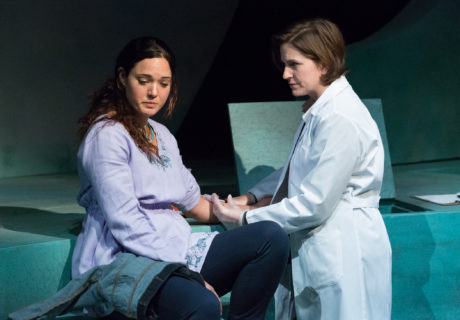Jillian, the main character of Deborah Zoe Laufer’s play Informed Consent, is a genetic anthropologist – a scientist who has studied DNA for years and is still amazed at what she learns from it. She marvels at what DNA tells us about how similar people are. “All humans are 99.9 percent the same genetically,” she says, chattering a mile a minute with a huge, content grin on her face. When she says she prides herself on being the smartest person in any room, you can easily believe her.

But for all her intelligence, Jillian is lacking in good judgment. It’s one thing to say that “Race isn’t biological. There are no genes that indicate race.” It’s quite another thing to say “There’s no such thing as white people – really.” Especially when you’re assigned to conduct a medical study of the Havasupai, an Arizona tribe that has been living in poverty and isolation – largely due to their treatment by white settlers – for decades. Jillian has to convince the tribe members to donate their blood for the study, a move that violates the tribe’s sacred beliefs. And the repercussions of that study change the tribe, and Jillian, forever.
The medical issue – based on a real-life incident involving the Havasupai – gives Informed Consent a compelling dramatic nucleus. But Laufer fleshes out the story by concentrating on Jillian and showing how, by focusing on people for their genetic similarity, she is unable to recognize what makes them unique and special.
Jillian’s husband Graham, a children’s book author, has all the understanding that Jillian lacks. When they tell bedtime stories to their young daughter Natalie, Graham tells a story about a fairy princess, while Jillian talks about cellular biology. And at a neighborhood party, Jillian – whose mother died in her thirties of early-onset Alzheimer’s in her thirties, and who is now showing the first signs of the disease herself – blurts out to the assembled crowd that she’s going to have Natalie tested for the disease. “She says whatever’s on her mind – I love it!” says an admiring neighbor. Graham, though, isn’t so admiring. “She’s four,” he says about Natalie. “Maybe we can teach her about crippling degenerative diseases when she’s five.”

Jillian’s insensitivity and obstinacy make her a frustrating and unsympathetic character at times. And Laufer’s script, while filled with engaging, naturalistic dialogue, tends to go overboard at times to prove its points. The fact that things will go awry during Jillian’s medial study is hinted at early too early and too obviously. And after Jillian commits an ethical transgression during her study, she defends her indefensible lapse over and over, in a series of repetitive scenes, until the fourth person she argues with finally makes her see the light.
It’s to the credit of actress Kittson O’Neill that Jillian never becomes unlikable. O’Neill projects warmth, sincerity, and a single-mindedness that convinces the audience that Jillian always has good intentions. We always want her to succeed. And when she starts showing the symptoms of her disease, we end up pulling for her then too. O’Neill delivers a winning and engrossing performance.
She receives strong support from the rest of the cast. Lindsay Smiling plays Graham as a man filled with compassion even when his patience is tested. Samantha Bowling radiates strength and dignity as Arella, the Havasupai representative who is conflicted as she tries to influence both Jillian and the tribal elders. She also gets laughs as Natalie, the always-moving, always-questioning daughter. Justin Jain and Maria Konstantinidis score in a number of dramatic and comic roles. (The play’s occasional comic asides flesh out the story without getting overly precious.)
Lance Kniskern’s abstract set design adds little to the presentation. But Nicholas Hussong’s projections – showing everything from genetic code to the starkly beautiful landscapes that the Havasupai call home – add a note of visual interest while helping to ground the production in reality.
Kathryn MacMillan’s direction moves the play forward at a steady, forceful pace, giving the piece a convincing urgency.

Informed Consent is a play filled with big ideas and a central character who struggles with them. And though that character stumbles at times, the play is filled with a richness and range that will give you a lot to think about.
Running Time: 90 minutes, with no intermission.
Informed Consent plays through February 12, 2017 at Lantern Theater Company, performing at St. Stephen’s Theater – 10th & Ludlow Streets, in Philadelphia, PA. For tickets, call the box office at (215) 829-0395, or purchase them online.




